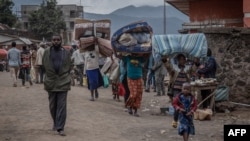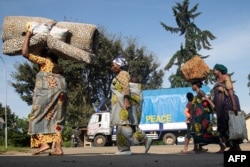A Ugandan official says a new influx of refugees from the Democratic Republic of Congo is stretching the country's resources to the breaking point.
On May 22, 2022, a joint operation by Congolese government soldiers and the U.N. peacekeeping mission MONUSCO against M23 rebels prompted hundreds of people to flee into Uganda. Hillary Onek, Uganda's Minister for Refugees, said the fresh influx is taxing resources.
The refugees flocked toward the Bunagana border crossing with little or no belongings. The country already is home to close to 1.5 million refugees from across the region.
"It is actually affecting even our population who are at the border," Onek said. "Because, when people shoot, sometimes they shoot across the border. Frankly speaking, it's overwhelming and we cannot satisfy the needs of those large influx of people and we are enabling what is feasible with respect to our meager resources."
The latest fighting took place around Rutshuru in North Kivu province. After clashes in the province last November, fresh fighting broke out late in March. It is estimated that about 17,000 Congolese refugees have since crossed into Uganda.
Manishimwe Bernard, a Red Cross official in charge of aiding refugees in Uganda's western Kisoro district, said most people arrive in desperate circumstances.
"When war broke out, people started running without anything," Bernard said. "You find a person has nothing, has no clothes, children are nearly hungry. So, emotionally, people run in stress. And of course, the panic and fear is still at large. Because fighting for now, from their stories, hasn't stopped."
On Sunday, the special representative of the U.N. Secretary-General in the DRC, Bintou Keita, issued a statement condemning attacks by the M23 movement against the peacekeepers in Rutshuru.
In the statement, Keita accused the rebels of deliberately attacking peacekeepers in eastern Congo, where fighting had resumed between the rebels and the Congolese army.
Bintou stated that in response to the attack, the army and peacekeepers mounted a joint operation to clear the area of M23 fighters. He said the attack was in accordance with MONUSCO's mandate.
Speaking to VOA by phone, M23 spokesperson Willy Ngoma denied the rebel group attacked the U.N. base. He said it was MONUSCO who attacked first, and those who were caught up in the fighting with the army got confused and started running. After just 12 minutes, he said, MONUSCO sent two Cobra attack helicopters in the area of Runyoni, which targeted the M23 bases.
The U.N. statement called on both the M23 rebels and the Congolese army to immediately cease all hostilities, in accordance with the commitments made in the Nairobi process.
The Nairobi process is an effort to negotiate peace between the Democratic Republic of Congo government and about 30 rebels based across the mineral-rich African country.
The M23 said that while they respect the Nairobi process, they are being attacked from various forces.





